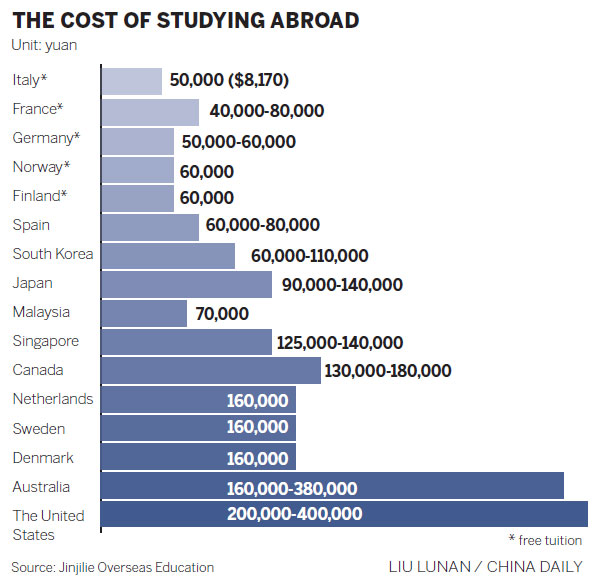Working-class students find low-budget education abroad
Updated: 2013-09-06 07:02
By Zhao Xinying (China Daily)
|
||||||||
With universities and colleges in European and Asian countries providing low-cost overseas study programs, an increasing number of working-class parents are sending their children abroad, which means that studying overseas is no longer the exclusive privilege of students from rich families.
According to the 2012 Blue Book of Global Talent released by the Chinese Academy of Social Sciences last year, 34 percent of students studying abroad in 2010 were from working-class families, while the figure for 2009 was only 2 percent, People's Daily reported.
However, studying in countries like the United States, the United Kingdom and Australia, which often costs $30,000 to $40,000 a year in total, is still a luxury for most students from working-class backgrounds.
Low-cost programs in some European and Asian countries, costing no more than 100,000 yuan ($16,340) per year, have become their first choice, said Zhang Wei, a consultant on Chinese students' education in Nordic countries with Education International Cooperation Group.
Zhang said his organization helped 220 students gain admission to Nordic colleges and universities in 2012. A further 270 students have received the same service so far in 2013.
Zhang said most of these students are from working-class families, and they chose their overseas study programs mainly because costs are lower in Nordic countries.
"Most public colleges and universities in Nordic countries, such as Denmark, Sweden and Netherlands, charge their students very low tuition fees. And some in countries like Finland and Norway even provide free tuition.
"Besides, the cost of living for a student in a Nordic country is about 60,000 yuan each year. That is to say, a yearly budget of 100,000 yuan is OK," he said.
Zhang said the overall cost of studying in a Nordic country is less than a half or a third of the cost of programs in the UK or the US.
"For many Chinese working-class families with a yearly income between 100,000 yuan and 200,000 yuan, such a cost is not a heavy burden. That means they can afford it," he said.
Situations in other parts of Europe, like Germany, France, Spain and Italy, are similar.
According to Si Qin, a course consultant on studying in Europe with Vision Overseas, a consulting company under the New Oriental Education and Technology Group, all the public colleges and universities in these countries provide tuition free of charge. Students only have to pay a registration fee, which is no more than 1,000 euros ($1,321), as well as meeting living costs ranging from 50,000 to 100,000 yuan each year.
Si said her organization helped about 250 Chinese students gain university places in these four countries this year, among which half come from working-class families.
Yang Lu, a 22-year-old girl from Xi'an, Shaanxi province, has just come back to China this summer with a bachelor's degree in French literature from a university in France.
"I was studying in a public university in La Rochelle, in western France. The university charged no tuition fees, except for a 500-euro registration fee each year," she said.
She added that living costs were not high, as La Rochelle is not a prosperous city like Paris.
Yang's mother, Jiang Yaping, said she and her husband earn about 10,000 yuan altogether per month, and they had prepared an annual budget of 100,000 yuan for their daughter.
"In fact, she spent only 50,000 yuan a year," she said. "It's not expensive studying there."
Jiang said her daughter learned much more than just academic knowledge during her three years in France.
"She also acquired independence, and she is now more polite and more considerate than before," Jiang said. "The studying experience was totally worthwhile, especially considering its low cost."
Quality education
But Si said the low cost is not the only reason why European public universities attract so many Chinese students. Quality of education also matters.
"Colleges and universities in different countries of Europe have their own special majors that rank high among all the universities around the world," she said. "For example, if you want to study a major related to machinery and automobiles, go to Germany. The same applies to aircraft manufacturing majors in France, architectural design in Italy and finance in the Netherlands.
"That is to say, for students who would like to study these majors, Europe is both a cheap and a good choice," she said.
In addition to Europe, some Asian countries like Japan, the Republic of Korea, Singapore and Malaysia are also gaining in popularity among Chinese working-class students.
"These countries are not far from China, and they have a lot in common with China in things like language, culture and tradition, which means it won't be hard for Chinese students to adapt to life and study there," said Zhai Weina, a consultant on studying in Japan with Education International Cooperation Group.
"This is a third advantage of studying in these countries besides low costs and good majors," she said.
Teng Hao, who will be studying for a master's degree in Japan this autumn, said she had also considered other countries, such as the US and the UK, but she finally chose Japan because it is both cheap and close to home.
"As my parents are getting older, I think it's better to stay near," she said. "It only takes a couple of hours to get home from Japan."
Teng also said she doesn't want to spend her parents' money.
"As tuition and living costs are not very high, I plan to work on my own to earn money while studying in Japan."
The 25-year-old, who is interested in cosmetics and worked in the industry after graduating with a bachelor's degree in chemistry, said she also believes that the prospects for employment in the industry are good in Japan.
"The cosmetics industry is developing well in Japan, and I hope I will have the chance to work there after I get my master's degree," she said.
The employment prospects for Chinese students in Nordic countries are also considered good. Zhang said that more than 60 percent of his clients were hired by local companies and institutes after graduation.
"For some excellent students in science and engineering, there is a good chance of achieving permanent residency," he said.
However, both Si and Zhai said that language issues would remain a challenge for Chinese students who study, work and live in European or Asian countries outside China.
"All these countries have their own mother tongue, which is not easy to learn," Si said. "You will never really adapt to local life if you are bad at the local language."
While some universities offer courses in a third language, such as English, most will require foreign students to demonstrate competence in the language of the host country before starting their course.
"Under such circumstances, I suggest students take language courses before going abroad, or take preparatory language courses after they arrive in that country," Si said.
zhaoxinying@chinadaily.com.cn

(China Daily USA 09/06/2013 page6)

 China, Russia a step closer on gas supply
China, Russia a step closer on gas supply
 18-year-old panda conceives triplets
18-year-old panda conceives triplets
 Testing times for G20 leaders
Testing times for G20 leaders Homemade choppers make aerobatic stunt debut
Homemade choppers make aerobatic stunt debut
 World-class partners bring NBA global games to Chinese fans
World-class partners bring NBA global games to Chinese fans
 Shanghai's visa-free policy lifts tourism
Shanghai's visa-free policy lifts tourism
 Panda twin cub born at Atlanta Zoo
Panda twin cub born at Atlanta Zoo
 Xi, Mexican president meet for third time
Xi, Mexican president meet for third time
Most Viewed
Editor's Picks

|

|

|

|

|

|
Today's Top News
Beijing's new product briefing a first for Apple
China, Russia a step closer on gas supply
Japan to test wall for leaking water
Low-budget education abroad for working-class
Shanghai's visa-free policy lifts tourism
Brazil asks for apology from US on spying
Xi calls for closer G20 ties
US service providers eye China
US Weekly

|

|





